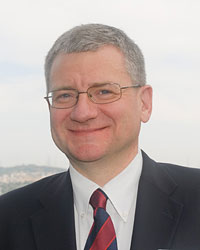Istanbul '09 Workshop
Rethinking NATO’s Strategic Concept: A View from Poland
Ambassador Boguslaw Winid
Permanent Representative of Poland on the North Atlantic Council
Before delving into the new Strategic Concept, let me briefly discuss one area where Turkey and Poland have recently worked together. This is in the creation of the new NATO Signal Regiment. We completed the process just last week during the NATO Ministerial. In this new structure, for the first time in history we will probably have a Turkish colonel commanding a signal battalion in Poland. This aptly illustrates the growth and capability development currently underway at NATO. The Signal Regiment will allow our troops in Afghanistan and elsewhere to perform better and is an ideal illustration of transformation and the manner in which we should continue to develop new technology.
THE NEW STRATEGIC CONCEPT
Regarding the new Strategic Concept, this is our priority for the coming weeks and months and we hope to complete the project before the NATO Summit in Lisbon next year or by 2011 at the latest. This is a challenging task since we have to find the common denominator for the strategic interests of 28 nations, which means 28 different perceptions of security and 28 different levels of sensitivity. But we have done this successfully in the past and I am certain we will be able to find common ground in this situation as well.
In terms of our vision, we of course attach great importance to Article 5 of the Washington Treaty as well as to capabilities related to collective defense. As discussed by previous panelists, there are no urgent threats looming on the horizon right now but we have to be ready for the future. We have absolutely no idea what will happen 10 years from now or what our security environment will be then. But we must find the proper balance between Article 5 and operations. As I mentioned above, with 28 different members and viewpoints we will probably have 28 different definitions of what balance or proper balance means, but that is the beauty of NATO.
We also agree that the forces participating in operations should be used for collective defense. There may be some tailoring needed, but this is the way forward and we understand that, should a situation arise in a few years time where one ally must be aided by the other allies, units which are more mobile will make it easier to do so. It is thus especially important for us to agree on the proper balance between units in terms of which ones are assigned to which roles.
From our perspective, operations are becoming increasingly important right now. We have more than 2,000 troops and are responsible for providing assistance to Afghans in the province of Ghazni. In terms of our plans to further develop our structure in Ghazni, we will probably go up to the brigade strength. Unfortunately right now we have to create a composition from different units coming from different structures. The goal is to create a system where we are able to rotate brigade for brigade, and the true measure of the success of the transformation of our land forces will be when we are able to do so. This is of course provided that the situation on the ground requires such a large structure. There is much progress currently underway and we hope that it will become even more visible in the coming months.
THE PRT AND CIVILIAN ACTIVITIES IN AFGHANISTAN
I would like to conclude with a few words about our Provincial Reconstruction Team in the province of Ghazni. We were faced with a situation where our forces and civilian employees were erecting public building projects during the day, and then during the night the OMF (opposing militant forces) or Talibans were destroying what we had just built. So our work was not very effective. We therefore analyzed what the Talibans were destroying-and especially what they were not destroying-and found that while of course their first targets were educational institutions, they were not touching any medical facilities or religious sites. So this gave us some options to work with.
In 2013 the city of Ghazni will be the world capital of Islam under the auspices of UNESCO. We are therefore implementing building and reconstruction projects which will help to showcase Ghazni in this role. It also means that we can put to this project many smaller initiatives which will benefit the overall development of the region as a whole. Most importantly, it is much safer for our Afghan colleagues building these roads and buildings as it does not put them in any personal danger from the Taliban. This is a highly effective way of helping Afghanistan.

